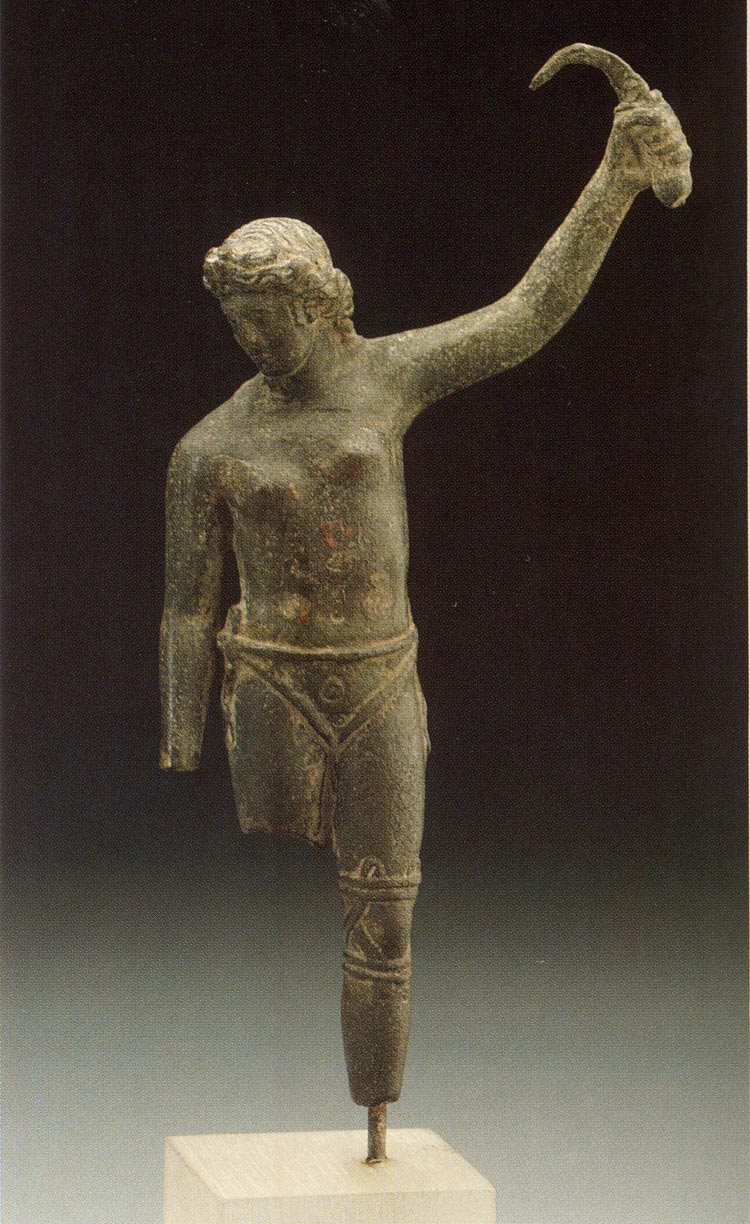Rare Ancient Statue Depicts Topless Female Gladiator

Get the world’s most fascinating discoveries delivered straight to your inbox.
You are now subscribed
Your newsletter sign-up was successful
Want to add more newsletters?

Delivered Daily
Daily Newsletter
Sign up for the latest discoveries, groundbreaking research and fascinating breakthroughs that impact you and the wider world direct to your inbox.

Once a week
Life's Little Mysteries
Feed your curiosity with an exclusive mystery every week, solved with science and delivered direct to your inbox before it's seen anywhere else.

Once a week
How It Works
Sign up to our free science & technology newsletter for your weekly fix of fascinating articles, quick quizzes, amazing images, and more

Delivered daily
Space.com Newsletter
Breaking space news, the latest updates on rocket launches, skywatching events and more!

Once a month
Watch This Space
Sign up to our monthly entertainment newsletter to keep up with all our coverage of the latest sci-fi and space movies, tv shows, games and books.

Once a week
Night Sky This Week
Discover this week's must-see night sky events, moon phases, and stunning astrophotos. Sign up for our skywatching newsletter and explore the universe with us!
Join the club
Get full access to premium articles, exclusive features and a growing list of member rewards.
A small bronze statue dating back nearly 2,000 years may be that of a female gladiator, a victorious one at that, suggests a new study.
If confirmed the statue would represent only the second depiction of a woman gladiator known to exist.
The gladiator statue shows a topless woman, wearing only a loincloth and a bandage around her left knee. Her hair is long, although neat, and in the air she raises what the researcher, Alfonso Manas of the University of Granada, believes is a sica, a short curved sword used by gladiators. The gesture she gives is a "salute to the people, to the crowd," Manas said, an action done by victorious gladiators at the end of a fight.
The female fighter is looking down at the ground, presumably at her fallen opponent.
The "precise real-life" details of the statue suggest the depiction was inspired by an actual person, a real woman who fought, Manas told LiveScience in an interview. [Photos: Gladiators of the Roman Empire]
It’s not known where the statue was originally found, though it is currently in the Museum für Kunst und Gewerbein Hamburg, Germany.
The rarity of such statues likely reflects the idea that female gladiators in ancient Rome were scarce. They were banned by Emperor Septimius Severus in A.D. 200 with only about a dozen references to them in ancient writing surviving to present day. The only other known depiction of them is a carved relieffrom the site of Halicarnassus (now in the British Museum) that shows two female gladiators fighting. There have been claims made in the past of burials of female gladiators being uncovered, but none has attracted widespread support among scholars.
Get the world’s most fascinating discoveries delivered straight to your inbox.
Identifying the gladiator
Scholars had initially suggested the statue represented a female athlete scraping herself with a strigil (a cleaning implement that can look similar to a sword). However, Manas noted several aspects of the artifact to suggest it instead represented a female gladiator.
One was the woman's stance. It would make little sense for an athlete to raise a cleaning instrument high in the air while looking down at the ground.However, raising a sword into the air was a common victory pose among ancient gladiators.
In addition, female athletes in the Roman world did not go completely topless, as they would wear a bikini or "a tunic that left one breast exposed," Manas pointed out. "In any case, female athletes never performed with bare breasts,” at least not with both exposed. Gladiators, on the other hand, tended to be slaves or people of low social status; depicting them topless would have been considered more acceptable. The bandage the woman is wearing on her knee is also a common feature of gladiators. [Roman Gladiator's Gravestone Reveals Fatal Foul]
Altogether, this evidence "seems to indicate that the statuette at the MKG [the museum] represents a gladiator, thus becoming the second piece of visual evidence we have of female gladiators," Manas writes in a recent issue of the International Journal of the History of Sport.
Anna McCullough, a professor at Ohio State University who has written about female gladiators, but is not affiliated with the research, is cautiously optimistic about this identification. "The gesture is far more similar to gestures of victory than it is to any depictions of athletes actually scraping themselves," McCullough said. "I think it certainly resembles a female gladiator more than (an) athlete, and I'm kind of happy to tentatively say that it is a gladiator in those terms."
One potential problem, she points out, is the fact that the "gladiator" is portrayed without a helmet, greaves (shin protectors) or other form of armor.
"The reason for this woman being topless might simply be that whoever made it wanted to sort of emphasize the fact that this is a female gladiator and not a male gladiator," she said, still "for her to be completely without armor is a little bit odd."
Both Manas and McCullough pointed out that it wasn't uncommon for men to go into the arena topless, although typically equipped with defensive gear such as a helmet, shield, greaves or even a breastplate.
McCullough said that, in real life, female gladiators would likely have worn more than a loincloth and bandage into the arena. Without the protective gear, the fighters would have been killed in large numbers. "If gladiators died every time that there was a fight in the arena, you would have a really hard time keeping up your population of gladiators in your gladiatorial school," she said.
Manas said that in real life, a gladiator like this would have had at least a shield and possibly a helmet. Perhaps she had taken off the helmet for the victory gesture or because the ancient artist wanted to show her hair, he speculated. Or maybe she did in fact go into the arena without a warrior's helmet so that people could see her face. As for her shield, she may have been holding that in her right hand, which is no longer present on the statue.
Erotic Romans?
Manas argues in his paper that, in addition to the athleticism typical of gladiator matches, female gladiator contests would have had an element of eroticism for Roman men.
"No doubt the particular appearance of female gladiators (with their breasts uncovered) would also cause an erotic impact on viewers," he writes. "In a society so militarised as the Roman one, in which weapons were so popular (but exclusive to men), to see a woman in that role, so different to the usual feminine one, wearing the armour of gladiators and showing so much of her anatomy, should also stimulate the imagination and the libido of spectators." [10 Innovations that Revolutionized Combat]
McCullough has a different interpretation. "In the literary texts that we have, female gladiators are not described in any kind of an erotic context or using erotic language at all," she said. The authors of those texts, she said, simply note that"women fought in the arena and they fought very fiercely and we were excited to see them."
If there were any sexual implication of the nude gladiator, it would've been due to her low social status. "In the Roman mind, there would have [been] certain associations with the sexual availability of slaves,” McCulloughsaid. "Slaves were sort of expected to be sexually available to anyone at anytime, especially their masters."
To, "depict a female gladiator, or a slave, nude was really no big deal," she said. "It was an indication of their extremely low status."
Follow LiveScience for the latest in science news and discoveries on Twitter @livescience and on Facebook.

Owen Jarus is a regular contributor to Live Science who writes about archaeology and humans' past. He has also written for The Independent (UK), The Canadian Press (CP) and The Associated Press (AP), among others. Owen has a bachelor of arts degree from the University of Toronto and a journalism degree from Ryerson University.
 Live Science Plus
Live Science Plus










